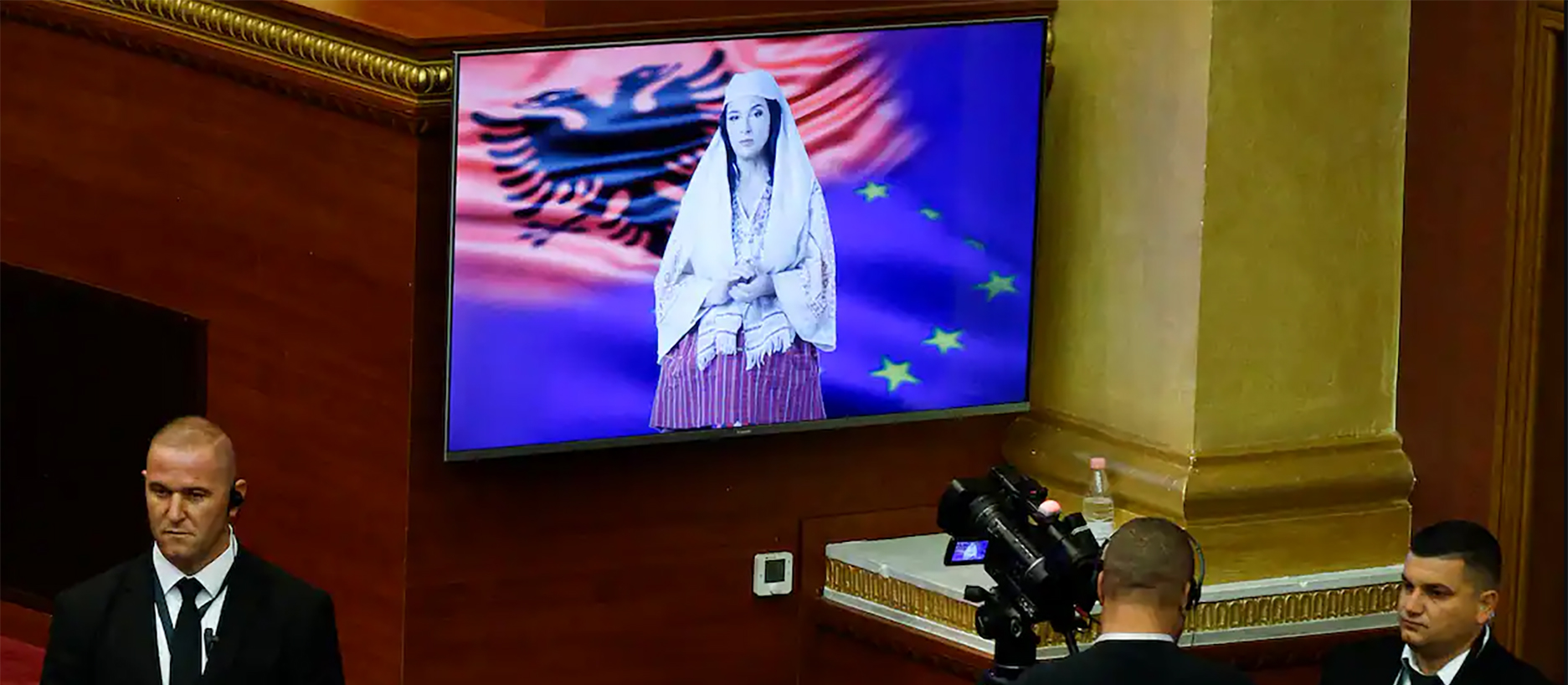In September 2025 Albania made history as the first country to appoint an artificial intelligence to a government post. The virtual minister “Diella” was given a mandate to oversee public procurement — an area that for decades has been a source of corruption scandals.
This decision by Prime Minister Edi Rama provoked a wave of enthusiasm, skepticism and political debate both inside the country and beyond.
AI against corruption
“Diella” began her career as a virtual assistant on the e-Albania platform, where she processed more than one million requests. Her avatar — a woman in traditional dress from the Zadrima region — symbolizes the combination of cultural identity and technological progress. Technically, she is based on OpenAI models and the Microsoft Azure cloud infrastructure.
The appointment of “Diella” was a response to the chronic problem of corruption that hinders Albania’s development. According to Transparency International, in 2024 the country scored only 42 out of 100 points on the Corruption Perceptions Index, ranking 80th out of 180 countries. The European Commission has repeatedly emphasized that corruption in Albania remains “widespread in all branches of government” and is the main obstacle on the path to EU membership.
“Albania must do more to combat corruption, ensure freedom of speech and transparency of ownership,” reads the EU position in the negotiations.
Prime Minister Edi Rama presents “Diella” as an instrument for a radical reboot of the system.
He told the BBC: “We can no longer afford to waste time fighting human weaknesses. AI is our chance to create a system where decisions are made without fear, favoritism or corruption”.
Analysts believe that this is not only a technological experiment but also a political signal to the EU: Albania is ready for unconventional solutions to meet requirements on transparency and the rule of law.
A case from the parliament: the debate was disrupted because of AI
During the approval of the new government composition in parliament, an attempt to give the floor to “Diella” caused an unexpected scandal. Her speech was broadcast on a screen, but opposition deputies began shouting “This is not a minister!” and “This is a violation of the Constitution!”, blocking the tribune. The Speaker of Parliament was forced to declare a recess, and the debates on the composition of the government were cancelled.
This episode became the first instance in history when a virtual minister provoked physical confrontation in the parliamentary chamber.
The Democratic Party of Albania sharply criticized the appointment of “Diella.”
Its representative, deputy Gazmend Bardi, stated:
“This is not a minister but software. The Constitution requires that a minister be a citizen. This is political theatre intended to distract attention from real problems”.
Other opposition politicians called the initiative “a media stunt” and “symbolic decoration” that has no real impact on the fight against corruption.
“Can an algorithm defeat corruption?”
The BBC, commenting on the appointment of “Diella”, states: “Albania has turned the image of the ‘heartless official’ into a positive quality”.
Other media ask: “Can an algorithm defeat corruption?”
The Guardian notes that “the use of AI in government is not only a question of efficiency, but also a challenge to democratic principles”.
Politico writes: “Albania has created a precedent that may inspire or frighten other countries. It all depends on whether ‘Diella’ can act independently of political influence”.
French AI ethics expert Jean-Gabriel Ganascia warns: “LLMs model society; they have biases. To assume that a machine has no biases is to submit to it”.
American researcher of digital democracy Sarah Whitmore of the Harvard Center for Ethics believes: “AI can be a useful tool, but it lacks legitimacy. Its decisions cannot be appealed, and that contradicts the principles of the rule of law”.
International response: inspiration or warning?
The appointment of “Diella” did not go unnoticed on the international stage. In Brussels, Berlin and Washington, experts on digital governance are closely watching the Albanian experiment.
Some see it as a breakthrough in govtech, others as a dangerous precedent that could legitimize delegating political responsibility to algorithms.
The government of Estonia, which has been implementing e-governance for more than a decade, called the initiative “an interesting but risky step”.
A representative of the Estonian Ministry of Digital Development said: “Automation of processes is a path to efficiency. But political decisions must remain in the hands of people who are accountable to society”.
In the United States, the National Institute of Standards and Technology (NIST) published an analytical note emphasizing the need for “clear boundaries between AI’s advisory role and executive authority”. The document calls on governments to avoid “simulating political participation” through digital avatars.
At the same time, in the Western Balkans — notably in North Macedonia and Serbia — calls are already being made to create countries’ own “virtual advisers” to combat bureaucracy.
In Belgrade, one deputy even proposed creating an “AI ombudsman” to monitor human rights.
Faceless power: a new era or a dangerous illusion?
Albanian human rights defender Ardiana Gjoni told Euronews: “We cannot allow responsibility to dissolve into code. If ‘Diella’ makes a mistake — who will be held accountable?”
In contrast, the government representative, Minister of Innovation Ervin Bushati, is convinced: “This is not a replacement of people but a supplement. ‘Diella’ does not make political decisions; it provides transparency of processes”.
German philosopher of digital ethics Thomas Metzinger writes in a column for Die Zeit: “We are entering an era where trust in algorithms may exceed trust in people. This is dangerous if there are no clear boundaries and control mechanisms”.
Scenarios of the future: AI as diplomat?
The appointment of “Diella” opens a discussion not only about internal governance but also about the potential role of artificial intelligence in foreign policy.
Can a virtual official participate in international negotiations? Is an algorithm capable of representing the interests of the state at summits or in intergovernmental commissions?
Some futurists suggest that AI could become part of technical delegations, especially in areas where rapid data processing is required — for example in negotiations on climate, trade or cybersecurity. But most diplomats are skeptical. The former French ambassador to Tirana, Michel Lambert, notes: “Diplomacy is not only facts but also intuition, emotions, interpersonal trust. An algorithm cannot replace the human sense of the moment”.
At the same time, the European Digital Policy Agency acknowledges that “AI can be a useful tool for scenario analysis, but not for making political decisions”.
Conclusion
The appointment of “Diella” is not merely a technological innovation but a challenge to traditional notions of power, responsibility and democracy. It became a symbol of Albania’s aspiration for transparency, but it also opened a discussion about the legal, ethical and geopolitical boundaries of using AI in governance.
Whether “Diella” will become an example for other countries or remain a unique case — time will tell. But already now it forces the world to rethink the boundaries between technology and power.



